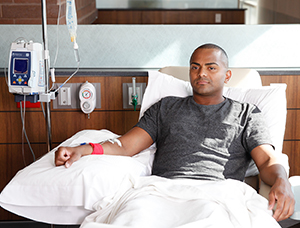Understanding Chemotherapy
Understanding Chemotherapy

How chemotherapy works
Chemotherapy kills cells that grow quickly. Many kinds of cancer cells grow fast. But many healthy cells grow fast, too. These include cells of the mouth, stomach lining, bone marrow, skin and hair. After chemo, these cells are able to grow back, but cancer cells die. That is why side effects such as hair loss, nausea, and low blood cell counts get better with time. Usually, chemotherapy is given in cycles of treatment. A cycle is the time from 1 cancer treatment to the next. For example, a 3-week cycle is treatment given 2 weeks in a row, and then 1 week off. A 3-week cycle may also be treatment given once every 3 weeks. Time between treatments during the cycle is needed to let normal cells recover before the next treatment.
The goals of chemotherapy
Chemo can kill cancer cells. As a result, it may do the following:
-
Shrink cancer before surgery. This is called neoadjuvent care.
-
Kill cancer cells that may remain after surgery. This is called adjuvent care.
-
Reduce symptoms such as pain. This is known as palliative care.
-
Control cancer for a period of time. This is also a kind of palliative care.
-
Cause remission. This means there is no sign of the cancer on medical tests.
-
Cure the cancer. This means there is no sign of the cancer years after treatment.
Side effects of chemotherapy
Because healthy cells are also damaged with chemo, you may have side effects such as:
-
Nausea and vomiting
-
Hair loss
-
Low red blood cell count (anemia)
-
Infections
-
Bleeding
-
Mouth and throat sores
-
Skin changes such as dry skin, itching, and acne
-
Lack of interest in sex
-
Trouble remembering and concentrating
-
Stress and depression
Long-term risks
There are some long-term risks with chemo. But the benefits usually outweigh the risks. Risks depend on the type of chemo used. Some possible long-term risks include:
-
Infertility
-
Damage to some organs, such as the heart, kidneys, liver, or lungs
-
Lasting nerve damage
-
Another cancer growing at a later time
Updated:
March 15, 2019
Reviewed By:
Brown, Kim, APRN,Levy, Adam S, MD